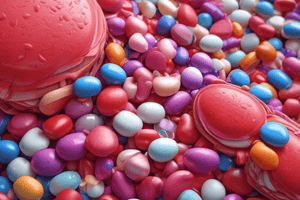Podcast
Questions and Answers
Which statin is not associated with causing hepatotoxicity as a side effect?
Which statin is not associated with causing hepatotoxicity as a side effect?
- Pravastatin (correct)
- Simvastatin
- Atorvastatin
- Lovastatin
What is the primary mechanism of action for statins?
What is the primary mechanism of action for statins?
- Increases triglyceride levels
- Promotes cholesterol absorption in the intestines
- Enhances HDL metabolism
- Blocks HMG Co-A Reductase enzyme (correct)
Which side effect is specifically associated with statin myopathy?
Which side effect is specifically associated with statin myopathy?
- Rhabdomyolysis (correct)
- Skin rash
- Teratogenic effects
- Nausea
What precaution should patients on statins take regarding their diet?
What precaution should patients on statins take regarding their diet?
During which time of day is it recommended for patients to take statins?
During which time of day is it recommended for patients to take statins?
Flashcards
Statins
Statins
Drugs like atorvastatin, simvastatin, and lovastatin that lower cholesterol levels by blocking the enzyme HMG Co-A Reductase, which is responsible for cholesterol production.
Myopathy
Myopathy
A condition characterized by muscle pain, weakness, and potential breakdown, which can be a serious side effect of statin medications. It can lead to rhabdomyolysis, impacting kidney function.
Rhabdomyolysis
Rhabdomyolysis
A dangerous condition caused by the breakdown of muscle tissue, releasing myoglobin into the bloodstream, which can damage the kidneys. It can occur as a serious side effect of statins.
Triglycerides
Triglycerides
Signup and view all the flashcards
Statins and Pregnancy
Statins and Pregnancy
Signup and view all the flashcards
Study Notes
Statin Medications
- Statins are a class of drugs used to lower cholesterol
- Drug names end in "-statin", examples include Lovastatin, Simvastatin, Rosuvastatin, Atorvastatin, and Pravastatin
- Nystatin is an antifungal agent, not a statin
Clinical Use
- Statins lower cholesterol levels, reducing risk of heart attack and stroke
- Treat cardiovascular conditions such as coronary artery disease and blood clots
Mechanism of Action
- Statins decrease cholesterol production by inhibiting the enzyme HMG Co-A Reductase
- Lowering LDL ("bad" cholesterol)
- Increasing HDL ("good" cholesterol)
- Reducing triglycerides
Side Effects
- Liver Damage (Hepatotoxicity): Regular monitoring is essential
- Myopathy (Muscle Pain): Muscle pain/aches, weakness or increased CK levels requires immediate reporting and adjustments to the treatment
- Rhabdomyolysis Risk: Muscle breakdown and kidney damage, a serious complication
- Gastrointestinal Issues: Nausea, vomiting, diarrhea, constipation, or abdominal cramping are possible side effects
- Other: Headache, rash, and other symptoms.
Contraindications
- Pregnancy: Statins are contraindicated (Pregnancy Risk Category X) due to teratogenic potential
Nursing Considerations
- Grapefruit Juice Interaction: Avoid grapefruit juice to prevent potentially elevated side effects
- Best Time to Take: Administer at night to align with peak cholesterol synthesis during the overnight fasting state
Studying That Suits You
Use AI to generate personalized quizzes and flashcards to suit your learning preferences.




